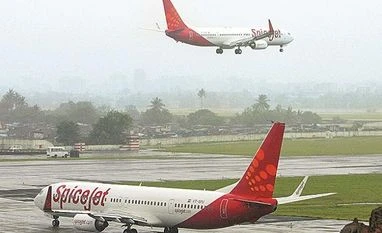A UK court has asked Irish aircraft lessor Goshawk and Indian low-cost airline SpiceJet to mutually mediate, despite recognising that the airline has defaulted on payment of lease.
Goshawk and its trustees had sued SpiceJet for $16.2 million, which the airline has been unable to pay.
In a summary judgment, the court, despite ruling that Goshawk is right to claim the amount, refused to take any action against SpiceJet on the grounds that forcing the airline to pay at this stage could result in its insolvency.
This clearly isn’t in Goshawk's best interest. It has instead asked the airline and the lessor to opt for an alternative dispute resolution (ADR).
The judgment, said airline executives, is a relief for airlines such as SpiceJet, which have been unable to pay lease rentals due to the impact of the Covid-19 pandemic.
But executives of leasing firms termed it “disappointing”, saying it weakened the ‘hell or high water’ clause which is part of the lease agreement. Such a clause compels airlines to pay lease rentals, irrespective of a force majeure.
“Normally, lease agreements are covered under the ‘hell or high water’ clause, which implies that lessees ( in this case, airlines) should continue paying lease rentals, irrespective of any issues like financial losses. This judgment casts a doubt on that protection and gives a breather to airlines,” said an executive of a leasing firm.
“The execution of all judgments is to be stayed for a period to allow the parties to undertake mediation or some other form of ADR and, or at least until trial of the remaining claims and cross-claims between the parties,” stated the summary judgment passed by the Business and Property Courts in London.
Business Standard has reviewed a copy of the judgment.
SpiceJet had leased three Boeing 737s from Goshawk (one B737-800 and two B737-MAX8s). On account of the pandemic, there were travel restrictions and the worldwide grounding of Boeing MAX8s. SpiceJet defaulted on its rent payment obligations and Goshawk applied for a summary judgment in relation to its claim for arrears.
A summary judgment is a court order which brings litigation to an early close. Such judgments are given when the court feels there is no compelling reason why a case should be allowed to proceed to trial, which would require a close examination of all the evidence. This saves the litigant parties significant time and expense.
Lawyers said while airlines can use the ruling as a precedent in future cases of default, it doesn’t overrule the lessor’s right to get rentals, which is secured under the ‘hell or high water’ clause.
Multiple airlines have defaulted on lease payments due to the outbreak of the pandemic, which has clipped the wings of the aviation industry.
In a summary judgment, the court has upheld the claim, except the claim for restoration of deposit where it has directed a trial and has passed a decree considering the terms of lease. The ‘hell or high water’ clause is usually a part of the lease term.
“But, in the overriding interest of justice, it has stayed its own judgment and asked them to go for an ADR, as it will be in the interest of everyone. Lessors are bound to be concerned that when they have a decree, why are they being denied their chances to enforce it. While the airline may cite this judgment as an example, it will only have persuasive value and will not be binding on an Indian court. It can be argued that it will be given on facts of that case,” said Ravi Nath, chairman and managing partner RNC Legal, a law firm which counts multiple lessors and banks as clients.
Indian airlines, like their global counterparts, have been negotiating with lessors to defer or restructure lease agreements, as businesses have been severely hit by the pandemic. While most have successfully restructured the lease agreements, the second wave of the pandemic is worrying lessors who doubt airlines’ ability to pay, especially ones with weak balance sheets.
For instance, SpiceJet is also facing a separate lawsuit in London over Rs 200 crore of unpaid charges. Ireland-based BOC Aviation and Wilmington Trust Services claimed that SpiceJet failed to pay rent and other charges, which as on September 3 amounted to Rs 48 crore.
SpiceJet’s rival Go Air, which is eyeing a public issue to raise Rs 3,600 crore, mentioned in its draft red herring prospectus that four aircraft lessors have sent default notices related to 24 aircraft, claiming $35.75 million.
In-flight wedding: SpiceJet crew de-rostered
A mid-air wedding took place on board a SpiceJet chartered flight on May 23, with guests violating Covid norms, said people in the know, adding that the crew had been taken off the roster and an inquiry ordered. The chartered flight, with 160 on board, left Madurai and remained airborne for approximately 2 hours on Sunday, before returning.
Unlock 30+ premium stories daily hand-picked by our editors, across devices on browser and app.
Pick your 5 favourite companies, get a daily email with all news updates on them.
Full access to our intuitive epaper - clip, save, share articles from any device; newspaper archives from 2006.
Preferential invites to Business Standard events.
Curated newsletters on markets, personal finance, policy & politics, start-ups, technology, and more.
)